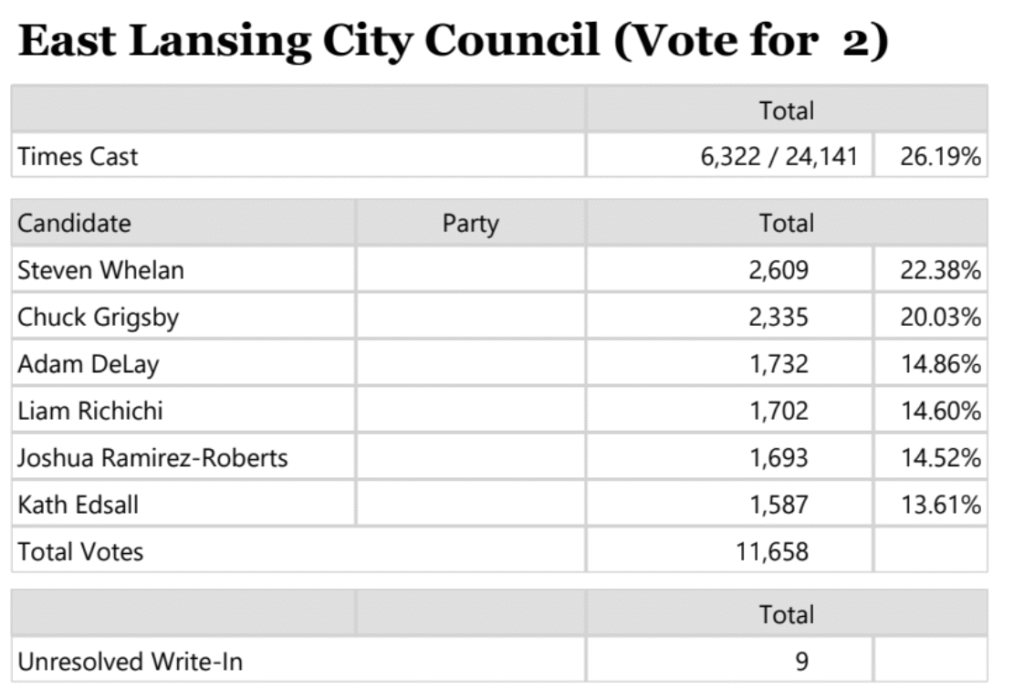The Numbers: East Lansing City Council Election Sees High Turnout, Two Candidates Run Away From the Field
East Lansing City Council elections are often decided by narrow margins, but Steve Whelan and Chuck Grigsby ran well ahead of the field at the Nov. 4 election.
Whelan collected 2,609 votes and Grigsby received 2,335 votes, according to unofficial results, to be elected from the field of six candidates. The remaining candidates were at least 603 votes behind Grisby, gathering between 1,732 and 1,587 votes.
There were 6,322 ballots cast and 11,658 total votes in the council election, as each voter had the option to select two candidates. This means Whelan appeared on 41% of ballots and Grigsby appeared on 37%. Third place finisher Adam DeLay appeared on 27% of ballots.

While Grigsby and Whelan had a healthy lead over the rest of the field this year, no candidate saw the level of support Kerry Ebersole Singh saw during the last City Council election. In 2023, Singh appeared on more than 60% of ballots when she was one of three candidates elected to serve on council.
This year’s City Council election saw high turnout.
The more than 6,300 ballots cast in this year’s council election is more than any recent election, surpassing the 2017 ballot total of 6,196.
There were over 800 more voters in this election than the 2023 race, and more than 1,500 more than 2021.

While turnout was high relative to local elections held in recent decades, the 26% of registered voters who cast a ballot is still much less than the turnout at November elections held during even-numbered years that include state and federal races.
At the 2024 general elections, there were more than 17,500 East Lansing voters, and just under 13,000 at the 2022 midterm elections.
Voters continue to utilize absentee ballots.
Absentee ballots continue to be a popular voting method for the area’s electorate, as 3,972 East Lansing voters made their selections via absentee ballot. This is compared to 2,129 Election Day ballots and the 221 votes that came in through early voting centers.
The 63% of East Lansing voters who participated in the election via absentee ballot is similar to the proportion of East Lansing residents who voted absentee in 2023.
Student vote ticks up, but still lags far behind the rest of the electorate.
East Lansing remains a college town that selects leaders with little input from college students.
At this election, there were five precincts that were designated as “MSU” precincts on the university’s campus. These precincts drew a total of 135 ballots cast.
In comparison, more than 4,000 ballots were cast at precincts on MSU’s campus during the 2024 general election.

While local races continue to draw far less student interest than state and federal elections do, this race actually brought a significant increase in ballots cast from campus precincts compared to recent local elections. At the 2023 council election, just 46 ballots were cast from campus precincts and in 2021, that number was just 37.
Even though the vote total from campus nearly tripled compared to the previous City Council election, campus votes weren’t much of a factor in this race. This is a change from races decades ago, when the student vote was significant enough to carry candidates to victory.
Voters reject ballot proposal.
While East Lansing voters usually approve new millages, the electorate soundly rejected a parks and recreation millage, as 61% of voters were against the proposal.
The proposed two mill property tax increase was paired with a proposed amendment to the city charter that would raise the property tax cap the same amount to make the new millage possible. The current property tax cap was put in place in 2019, after voters allowed the city to install an income tax.
Critics of the millage said it was misleading for the city to label it a parks millage because it did not provide a substantial increase in funding for parks. The millage would have raised just under $3 million per year, funds that would have replaced the general fund’s roughly $2.6 million contribution to the parks department.
Shifting parks funding from the city’s general fund to the millage would have helped ease the strain on the city’s general fund, which is budgeted to run at a deficit this fiscal year.
Now that the millage has failed, it does not mean the parks department will lose the general fund’s entire contribution, about 40% of its budget. Rather, cuts to the parks department – and other city departments – will be considered next budget season. Had the millage passed, the parks department would have been insulated from cuts.
City leaders have different views of where the city sits financially and how necessary the millage was.
At the Oct. 21 City Council meeting, the last before the election, outgoing Mayor George Brookover said the next council will have the “job from hell” addressing finances if the millage does not pass.
Councilmember Erik Altmann said he believes the deficit the city is running at is even larger than previously projected.
Altmann said he thinks the city has about a $4.2 million structural deficit that will persist without changes. Altmann said the extent of the deficit is worse than was discussed last budget season because staff vacancies have masked the actual cost of running the city, infrastructure costs are increasing and the city will receive less funding from the state. He added that the Michigan Supreme Court’s ruling against the city in the Lansing Board of Water and Light franchise fee lawsuit earlier this year will cost the city about $1.5 million in revenue each year.
“If it [the millage] fails, then we are facing deep cuts to public services,” Altmann said at the Oct. 21 council meeting. “And they will happen relatively soon because we don’t have much of a cushion. They will happen starting in the next budget cycle.”
Councilmember Mark Meadows, however, opposed the millage and said he doesn’t think the city’s finances are quite so dire at the Oct. 21 meeting. Meadows, who was first elected to City Council in 1995 and has spent more than 15 years on the body since, said it isn’t unusual for the city to be budgeted to operate at a deficit, and projections at the start of the fiscal year are often worse than the numbers at the end of the year.
“I think we have time to deal with this in another way,” Meadows said at the meeting.

